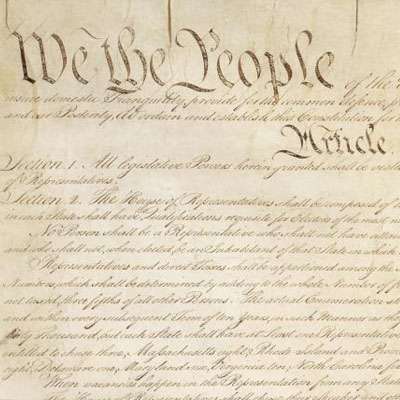The Volokh Conspiracy
Mostly law professors | Sometimes contrarian | Often libertarian | Always independent
Today in Supreme Court History: September 17, 1787
9/17/1787: The Constitution is signed.

Happy Constitution Day!
Editor's Note: We invite comments and request that they be civil and on-topic. We do not moderate or assume any responsibility for comments, which are owned by the readers who post them. Comments do not represent the views of Reason.com or Reason Foundation. We reserve the right to delete any comment for any reason at any time. Comments may only be edited within 5 minutes of posting. Report abuses.
Please to post comments


Twelve states appointed 70 delegates to the 1787 Constitutional Convention. (Rhode Island did not send any.) 55 delegates actually showed up to the convention, some having declined their appointments or being unable to attend for various reasons. 41 made it to the end, and 38 of those signed the Constitution.
Four signers of the Constitution would go on to serve on the Supreme Court: William Paterson of New Jersey, James Wilson of Pennsylvania, John Rutledge of South Carolina, and John Blair of Virginia. Connecticut delegate and future Chief Justice Oliver Ellsworth left the convention early for business reasons, but would write in support of ratification. Maryland appointed furure Justice Gabriel Duvall a delegate to the convention, but he declined the appointment. Likewise, Robert Harrison another Maryland appointee who declined his appointment, would be nominated to the Supreme Court by President Washington and confirmed by the Senate, but would decline the appointment for health reasons. (Harrison would pass away a little more than six months after declining his appointment to the Supreme Court).
Today is also known as Citizenship Day.
Naturalized citizens learn about the Constitution in part to pass their citizenship exam. The rest hopefully learn some in school and elsewhere, including online blogs. Some stuff actually true!
https://constitution.congress.gov/constitution/
James Wilson was the only person who signed the Declaration of Independence and the Constitution and served on SCOTUS, He was responsible for starting our Constitution with the words "We the People." Later, Justice Wilson some of the most important, insightful words in any SCOTUS opinion.
The heart and soul of our Constitution is only implicit in its text and structure: “the term SOVEREIGN” is not used in our “Constitution.” Chisholm v. Georgia, 2 U.S. (2 Dall.) 419, 454 (1793) (Opinion of Wilson, J.). But the Preamble is the “one place where it could have been used with propriety.” Id. Only those “who ordained and established” our “Constitution” could “have announced themselves ‘SOVEREIGN’ people of the United States.” Id.
The first and foremost separation of powers in our Constitution is between the sovereign people and all public servants. So “The PEOPLE of the United States” are “the first personages introduced.” Id. at 463. After introducing the sovereign (the people), the text and structure of Articles I, II and III further emphasized the people’s sovereignty. They introduced our directly-elected representatives (Congress), then, our indirectly-elected representative (the president), and, last, our unelected representatives (judges). The people “vested” only limited powers in public servants in and under “Congress” (U.S. Const. Art. I, §1), the “President” (Art. II, §1) and the “supreme Court” and “inferior Courts” that “Congress” was delegated the power to “ordain and establish” (Art. III, §1).
A difficulty with this argument is that the states ratified the constitution rather than the people directly through some sort of plebiscite. Similarly, states and not the people are responsible for amending it.
In general, both the people and the states have a place in the constitution and both have a hand and a say in the federal government. The Constitution was a compromise among people with different views on many subjects, including popular sovereignty vs. state sovereignty and rights. The stares, as sovereign states, surrendered a portion of their sovereignty to the federal government when they ratified and adopted the Constitution. But they kept the rest. They remain sovereigns, although incomplete ones.
It is always possible to cherrypick quotes from ones favorite founders favoring ones prefered views and then claim that this is the position all the Founders and the Constitution as a whole took. Lots of flowery language doesn’t change this.
Whatever else can be said about Trump v. Anderson, it was most certainly not originalism.